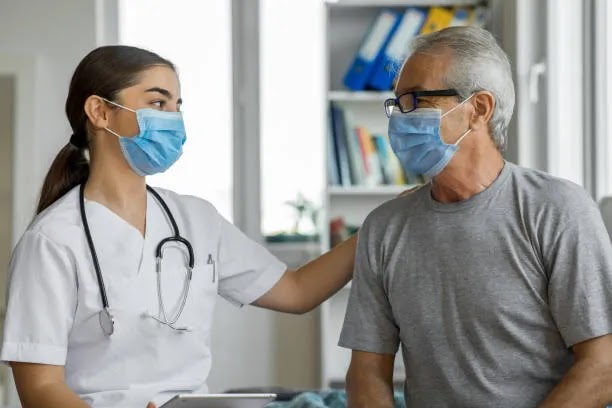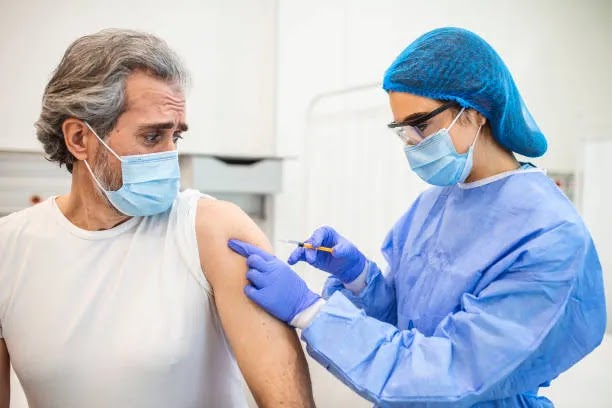We should all be familiar with the symptoms of COVID, which include cough, fever, fatigue, body aches, muscle aches, and shortness of breath, among others. However, some persons experience unique symptoms of the virus that aren't well known, in addition to the usual woes. Researchers are still trying to figure out why some people experience unusual symptoms while others do not. Doctors revealed strange COVID signs and explained why symptoms vary so significantly. Continue reading.
1. No Medical Explanation or Remedies Yet for Loss of Smell or Taste
According
to Dr. Ali Jamehdor, DO, Medical Director of Dignity Health St. Mary's Medical
Center's Emergency Department, "The 'usual' signs and symptoms of COVID
infections are well-known to most people. Headache, body soreness, cough, sore
throat, and fever. However, we've seen several COVID-19-related symptoms that
aren't generally linked with an upper respiratory viral infection. Remember
when we first started hearing about people losing their ability to smell or
taste? This appears to be more common with the original COVID-19 virus than
with the Delta variant... We don't see the Omicron variant anymore because it
has become the superior variant. While it's not unusual for people to lose
their sense of smell or taste when they have a cold due to congestion and other
inflammatory processes in the oral nasopharyngeal cavity, this loss of smell
and taste was occurring in patients who had no other symptoms. Some people
would lose these senses for hours, days, or even weeks, and some people have
not regained them for more than a year. There hasn't been a true medical
explanation for this, and there don't seem to be any treatments available at
this time, but thankfully, this symptom appears to be losing its potency, and
we're seeing fewer and fewer cases of it."
2.
Diarrhea
A
board-certified nutritionist from Harvard University who is also board
certified in internal medicine, Dr. Michael Hirt of The Center for Integrative
Medicine in Tarzana, California, says that "the body is designed to heal
itself." "The majority of individuals who experience COVID diarrhea
believe they have a minor case of food poisoning or that they ate something
that didn't 'agree' with them because the other classic COVID symptoms are not
present at the same time. With this virus, viral shedding in the stool is so
common that 'COVID hunting' public health officials sample community wastewater
to track virus levels in cities, neighborhoods, and even college dorms."
3.
Skin Rashes
Dr.
Teresa Bartlett, Sedgwick's chief medical officer, explains: "Skin rashes
are a strange symptom that we've seen in certain cases. Rashes on the body,
head, and even COVID toes that appear to be bruised. The Omicron variant is
causing a lot of folks to develop a really bad sore throat, which was not the
case with the previous variants. People appear to have either a minor stuffy
nose and scratchy throat or are seriously ill, with headaches, dizziness,
cough, fever, and severe fatigue."
4.
Tinnitus
Audiologist
and Hearing Aid Specialist Dr. Hadassah Kupfer adds, "Tinnitus, or ringing
in the ears, has been reported after infection with Covid-19 or even after
vaccination with Covid-19 and boosters. COVID immunization is widely prevalent
and/or compulsory across most work sectors, and we've seen multiple cases of
high community spreading of COVID infection in our NYC audiology practice.
Tinnitus is frequently a symptom of inner ear damage, which leads to a
noticeable hearing loss. Although there is no clear link between COVID and
Tinnitus, one possibility is that the cytokine storm that occurs in COVID
patients may damage the very sensitive cochlea (inner ear). If this is right,
patients with underlying risk factors for hearing loss (diabetes, heart
disease, prior noise exposure, prior diagnosis of hearing loss) will be more
vulnerable to COVID auditory symptoms, which may accelerate the pathological
process. In people with autoimmune diseases, the delicate cochlea is also more
vulnerable since their bodies are more likely to attack itself."
5.
COVID Symptoms Can Appear in the mouth
Dr.
Mansi Oza, a dentist in Maryland, believes that "The COVID virus attaches
itself to the cells in the mouth. It spreads to the lower lobes of the lungs,
the gut, and other areas of the body by entering through the blood and
swallowing from the mouth." As a result, Dr. Oza notes that the symptoms
mentioned below may appear in the mouth.
- Loss of taste
- Severe dryness in the mouth
caused by salivary gland damage caused by the virus
- White coating on the tongue,
which looks like oral thrush. This is caused by a rise in the
opportunistic growth of pathogens like fungi and bacteria.
- Color and texture changes of
the tongue seem to be associated with the severity of the disease. Dark
red to purple due to lack of oxygen reaching the tongue
- Greasy/furry texture: due to
oxygen free radical damage and decreased capability for
anti-oxidation."
6.
Why These Symptoms Only Occurring in Some People
"People's
symptoms are mostly dependent on their immune condition and how their bodies
respond to the virus," says Dr. Bartlett. "It could also depend on
the variant you've been exposed to and if you've gained immunity to COVID 19
from immunizations or previous infections. Your immune system's health is
closely related to how well you take care of yourself by eating a well-balanced
diet, exercising regularly, and sleeping sufficiently."
7.
Why COVID Symptoms Vary so Much
According
to Dr. Bartlett, "The virus's symptoms and the time it takes to contract
it differ. I've seen incidents where two people were in a car for hours without
wearing masks, and the next day one of them became sick with the virus while
the other did not. Keep in mind that asymptomatic carriers could accidentally
transfer the virus. All of this variation is thought to be influenced by
factors such as age, underlying health issues, blood type, race, social
determinants of health, prior vaccinations, prior infections, and how much of
the virus you were exposed to."
8.
Should People Who Contract Abnormal Symptoms be Concerned?
"Not
at all. While scientists continue to research all of the various symptoms and
implications, there is no reason to be concerned unless something troubles you
after you have "recovered." If you have any concerns, go to your
doctor as soon as possible "According to Dr. Bartlett.
9.
How to Stay Safe Out There
Get vaccinated or boost your vaccinations as soon as possible; if you live in an area with low vaccination rates, wear an N95 face mask, avoid large crowds, don't go indoors with people you aren't sheltering with (especially in bars), practice good hand hygiene.










